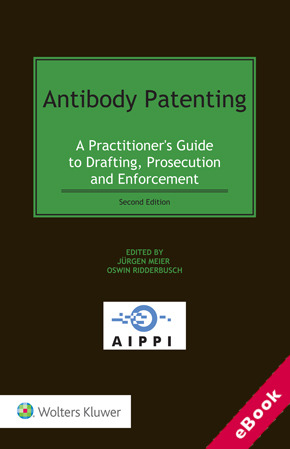
The device(s) you use to access the eBook content must be authorized with an Adobe ID before you download the product otherwise it will fail to register correctly.
For further information see https://www.wildy.com/ebook-formats
Once the order is confirmed an automated e-mail will be sent to you to allow you to download the eBook.
All eBooks are supplied firm sale and cannot be returned. If you believe there is a fault with your eBook then contact us on ebooks@wildy.com and we will help in resolving the issue. This does not affect your statutory rights.
Antibodies have revolutionized medicine and biotechnology, and have become indispensable tools in therapy, diagnostics, analytics, and research. Therapeutic antibodies, for example, have become firmly established in the ranks of blockbuster drugs, currently accounting for about half of the top 10 best-selling medicines. At the same time, a body of case law dealing specifically with the patentability of antibody-related inventions and the enforcement of antibody patents has emerged in major jurisdictions. The, at times, significant divergences between different jurisdictions have been compounded by recent decisions in the United States, which have severely curtailed the possibilities to obtain broad antibody patents. It is therefore essential to understand how antibody inventions are assessed in different jurisdictions in order to secure an optimal patent protection and to successfully enforce such patents.
This book provides practitioners with a comprehensive resource elucidating all aspects of the patenting of antibodies from initial drafting and prosecution to enforcement, using a country-by-country format. The updated and expanded Second Edition covers more than 30 of the most important IP jurisdictions worldwide – i.e., the European Patent Office, Belgium, Denmark, Finland, France, Germany, Hungary, Ireland, Italy, the Netherlands, Poland, Spain, Sweden, Switzerland, the United Kingdom, the United States of America, Canada, Mexico, the Andean Community (Bolivia, Colombia, Ecuador, and Peru), Argentina, Brazil, Chile, China, India, Israel, Japan, Singapore, South Korea, Taiwan, Australia, and New Zealand. The 49 contributors to this book, all distinguished experts in this field, provide clear and practice-oriented advice on a range of topics including:
All chapters follow the same structure, which makes this book easily accessible and allows a direct comparison between different jurisdictions. Practitioners will find the much-needed tools and guidance to secure the best possible patent protection for antibody inventions in more than 30 of the most important jurisdictions worldwide.